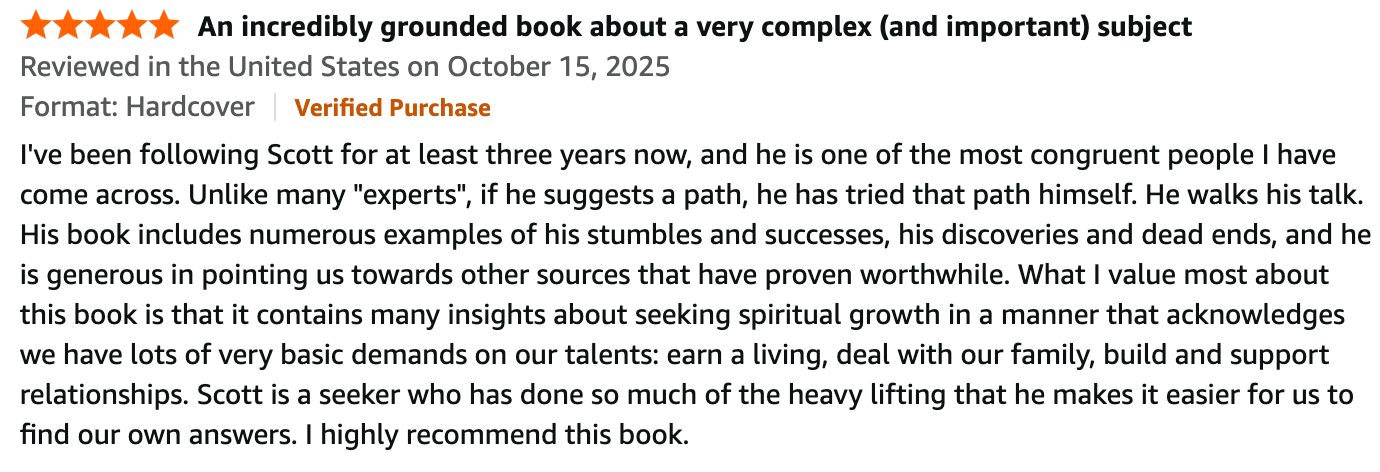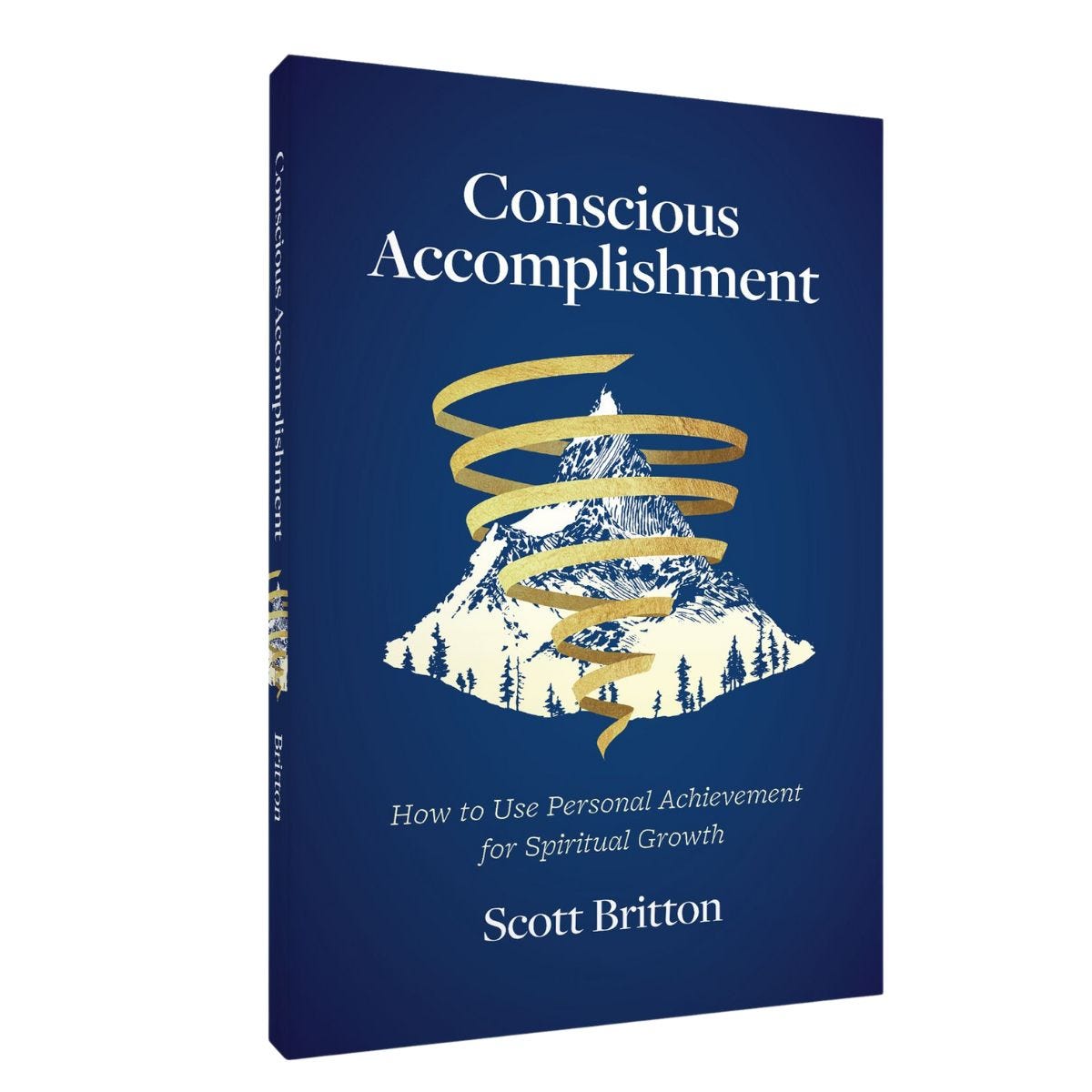How To Relate To Ambition On A Consciousness Path
Are you running on clean fuel of dirty fuel?
I’ve been sharing chapters from Conscious Accomplishment that I think might be particularly helpful. Today’s chapter outlines how to relate to and work with ambition when you’re on a consciousness path. Here’s what others are saying about the book:
Chapter 18: Ambition - Clean Fuel vs. Dirty Fuel
When you think something outside yourself is going to solve your problems, it’s common to place ambition on a pedestal. The more ambitious you are, the more you can achieve and perfect your life. This might as well be the anthem for Western culture. When you begin your consciousness work you may discover that most of your previous ambition was driven by unhealed wounds. This can be confusing. Once I recognized the source of my own striving, I wondered if ambition might somehow undermine my spiritual growth? Resolving this confusion requires a nuanced understanding of ambition’s different forms and how they can impact your consciousness evolution.
What is ambition really? A strong desire and determination to work towards something greater. There is nothing inherently counterproductive about ambition if you’re on the spiraling-up journey of consciousness evolution. What matters is where your ambition comes from.
Healthy ambition arises from sources aligned to your true nature such as inspiration, love, and a desire to contribute. When you have it, you feel a deep calling to improve the world around you to the best of your ability. This is our natural state of ambition before our conditioning and identification with unhealthy patterns.
Unhealthy ambition is when your desire to achieve emanates from unhealthy patterns created by your past. In this context, the drive for achievement is often fueled by unconscious fears of inadequacy, rejection, or failure. Rather than facing these feelings directly, people attempt to achieve their way out of suffering, which never works. Maybe you feel an incessant drive to accomplish more or constantly improve yourself so that you’re recognized by your peers. Or maybe you’re motivated to make a ton of money so that you will feel safe. The challenge for most people is that unhealthy ambition is usually driven by unconscious patterns. So you move through life with an incessant hunger for more without ever having a real understanding of what’s driving you. This might get you some pats on the back from others climbing the mountain of success, but it doesn’t really do much for improving your sense of enduring well-being or understanding.
Unhealthy ambition tends to correlate with performing actions as a means to an end instead of following inspiration. For example, maybe you opt to continue climbing the corporate ladder so that you can hit your financial goals. You tell yourself that when you have a million dollars in the bank, then you can pursue your dream of making music for a living. If you continually interrogate the context of why you’re doing something as a means to an end, it will culminate in a desire to feel a certain way. In the corporate ladder example, what you’re actually longing for is not a million dollars, but a sense of safety that will give you confidence to pursue your dreams. This instigates the question of whether there’s a more direct way to achieve the feeling you desire.
It is the context of your ambition that determines whether it supports or undermines your consciousness evolution, not the content. This means that it’s less about whether you want to make a million dollars or not, but where that desire comes from. Continuing to feed unhealthy ambition simply reinforces the underlying patterns that drive it. Although this may help you get to the top of the mountain that you imagine will make you happy someday, it doesn’t do much to move you up the spiral. Conversely, when you turn inward to investigate any indication of unhealthy ambition, you step towards a higher altitude of well-being and understanding. From this elevated vantage point, you’re more equipped to determine the best path forward.
Even if you aren’t fully sold on the whole consciousness evolution thing, there’s practical reasons to pursue healthy ambition. Healthy ambition is like clean fuel. When you run on it, you can sustain your energy and activities for long periods of time. Endurance comes naturally because you’re doing things that are intrinsically rewarding instead of needing to achieve some outcome.
Unhealthy ambition is like dirty fuel. Dirty fuel may get things moving, but it’s unlikely you’re going to be able to sustain yourself or avoid breaking down. At a basic level, this happens because you’re constantly chasing the next thing, thinking that one more accomplishment, milestone, or dollar will bring happiness. This keeps you locked in a cycle of overexertion, never quite able to recover and enjoy the present moment. On a deeper level, breakdowns occur because you’re operating from a place that’s out of alignment with your true nature. Eventually this becomes unsustainable, leading to burnout and a lack of fulfillment. One fuel source provides an enduring path to well-being and alignment, while the other keeps you spinning your wheels inside your patterns.
The path to healthy ambition isn’t driven by force or intellect, but by cultivating the inner conditions that allow it to arise naturally. The deepest part of your being already wants to uplift the world around you from a place of love and inspiration. However, there’s unhealthy patterns that you’ve become identified with that obscure your true nature. Continuously working with your response life creates the conditions for restoring healthy ambition.
My personal journey evolving from unhealthy to healthy ambition was a gradual shift that came through continuous purification. As the unhealthy patterns fell away, I became more inspired and energized to do things simply because I enjoyed them. This coincided with a growing desire to help others. I wasn’t actively trying to conjure these feelings. They were just a natural byproduct of shifts in my consciousness.
The truth is that ambition and consciousness evolution are compatible. When it’s healthy and aligned, ambition can be fantastically supportive for your well-being, fulfillment, and contribution. If you need further evidence, just look at some of the most enlightened beings that have shaped history. I think it’s fair to say that anyone who sought to spread a message that opposed the status quo must have held some degree of healthy ambition. Otherwise, they would have just lived as a recluse and not gone to all the trouble of helping people.
True Conscious Accomplishment isn’t about losing ambition—it’s about purifying it. It shifts the fuel from fear and striving to inspiration, love, and contribution. If you seek to develop a healthy relationship with it, the key activity is examining the context of your ambition. To bring awareness to where you’re operating from, there’s a few things you can place your attention on.
Push vs. Pull
Do you feel pulled to do the activities you spend your time on because you enjoy them? Or do you feel like you need to push yourself to achieve some future outcome or to avoid catastrophe?
Let me share two contrasting experiences from my entrepreneurial journey that illuminate this distinction. For the first four years of my last startup, I’d force myself to go into the office every Saturday, and sometimes on Sundays. If I didn’t work, I’d become anxious that we weren’t making progress fast enough. Whenever I didn’t get a few hours of work in on the weekend, the feeling of falling behind would often spoil the rest of my day. My unconscious strategy for dealing with this was being vigilant about working on weekends.
When I started working with my response to life, these disturbances became opportunities. Anytime I felt distressed about falling behind, I started to turn towards it. This gradually exposed the underlying fear and self-worth issues that kept me chained to my desk. By working on these patterns directly, the pressure to work on the weekends started to fade. For the first time in years, I was able to enjoy myself regardless of whether I cleared my inbox on Saturday. This type of freedom was something that no amount of productivity had ever delivered.
Let’s contrast this with how I have felt writing this book. One day after a long conversation with a friend about many of the ideas in this book, it became obvious that I needed to share this information. Once I felt the call, I became energized and couldn’t wait to start writing. Every day I felt this pull to just sit down and continue writing. I regularly found myself in a flow state for hours, barely noticing time pass. Sometimes it felt like the book was writing itself.
The difference between these experiences is striking. One was driven by fear and required force, while the other was fueled by genuine inspiration and enjoyment.
When you pursue activities because you enjoy and feel a natural pull towards them, that’s a sign of healthy ambition. When you feel like you’re pushing yourself to do some means-to-an-end action, that might be worth examining.
Healthy ambition carries a quiet acceptance of however things unfold. This is partially because you’re doing things for the sake of enjoyment instead of trying to get somewhere. The prize is the process, not a few moments at the top of the mountain. You still do your best to create good outcomes, but when things don’t go your way, you’re less affected because you’re driven by an intrinsic reward.
A Chain Of Whys
Another way to understand the root of your ambitions is continuously asking why you have them. Maybe you feel driven to plug away at a job you hate until you hit your financial goal. Someday once you’ve hit your magic money number, then you’ll think more seriously about what you actually want to do. To investigate this, you can start by asking yourself, “Why do I need to make a certain amount of money?” Maybe you want to have a nice apartment. “Why do I need to have a nice apartment?” Maybe you value nice aesthetics in your home. If you keep going down the chain of why’s, you’ll most likely get to a point where you realize you’re pursuing things to try to feel a certain way. This is squarely down the fairway of the outside-in paradigm. Bringing awareness to this, yet again, inspires the question of whether there is a more direct way of feeling how you want to feel as you work toward your goals. Yes, there is a way, and it’s called Conscious Accomplishment.
You can perform the chain of whys exercise intellectually, or through a dialogue with your true Self, if that’s accessible to you. (I share more on the latter in Chapter 21, on Self Repatterning.) Now is the time to be honest with yourself and keep going until you get to the root. As you do this, keep an eye out for rationales that reflect means-to-an-end thinking or the avoidance of certain outcomes. If you discover any indication of unhealthy ambition, the call is always the same. Simply face and accept what you’ve learned about yourself with an open heart.
Spiritual Ambition
The distinction between healthy and unhealthy ambition applies to all parts of life, including your consciousness evolution. It’s common among high-achievers to apply the same patterns that drove the relentless quest for success to their spiritual growth. I know because I did it and have seen many others do the same. This tendency can be hard to spot, because our motivations are often unconscious. Spiritual striving may help you prioritize inner work early on, but there will always be a ceiling on your development when you approach it from this context.
There was a time when I was obsessed with evolving rapidly and had little interest in anything else. This drove me to be incredibly disciplined with all my practices. I thought this approach would put me on the fast track to some spiritual enlightenment. In reality, I was unable to see how my perfectionism had simply been aimed at a new target. One day it dawned on me. When I wasn’t able to do my practices, I reacted in the same sour way as when I couldn’t work on weekends. I decided to turn towards this and couldn’t believe what I discovered. Behind all my vigilance, there was a deep-seated fear that I needed to get enlightened before something bad happened to me. Instead of my desire to evolve being driven by love or joy, it was fueled by a lack of safety. I guess this approach was enlightening after all. It helped see that under my monk’s robes, there was still a warrior’s armor.
As I began working with this pattern, my approach to working on my consciousness became much more relaxed and balanced. I continued to work diligently, but if I wasn’t perfect with my practices, it wasn’t that big of a deal. Each day I’d give myself the freedom to choose to do my practices because they were rewarding, instead of doing them out of obligation. Paradoxically, as the need to reach some spiritual destination faded, my awareness and understanding began to expand rapidly. The vigilance that had once been useful, had become a block to a higher vista on the spiral. This would not be the last time in my journey that a tool would eventually become a barrier.
Like other parts of your life, healthy spiritual ambition is motivated by forces like inspiration, love, and enjoyment. Unhealthy spiritual ambition usually comes from a place of fear or “not enough–ness.” It is often characterized by a fixation on reaching some level of spiritual evolution. For example, you may think enlightenment is the only thing that matters and that you need to get there quickly like I did. You can examine the context of your spiritual ambition, just like any other part of your life. Notice your relationship to the activities you pursue. If you detect any type of disturbance or pushiness, turn towards this to become aware of the underlying context. This will help you reorient any spiritual mountain-climbing to upward-spiraling.
Teachings
The context of your ambition determines whether it supports or undermines your consciousness evolution.
Healthy ambition is motivated by qualities aligned with your true nature such as love, inspiration, and a desire to contribute.
Unhealthy ambition is when your actions emanate from unhealthy patterns created by your ego, which wants to avoid harm.
Means-to-an-end actions are often fueled by unhealthy ambition.
You can determine the context of your ambition by examining where you feel pushed vs. pulled, working with your response to life, and inquiring about why you want things.
Healthy ambition usually results in better outcomes in the long run because it’s much easier to sustain your activities and energy.
I hope you enjoyed this chapter! You can keep reading or listening by checking out Conscious Accomplishment on Amazon 🙏





Boy oh boy I sure wish some of the public leaders out there running on very dirty, filthy fuel would get their fuel injectors fully plugged up.
This feels so familiar and has certainly been my experience. For over 10 years, I built a company in response to my wounds, only to realize it four years ago and suspend its expansion until I could return more integrated. 🎯❤️